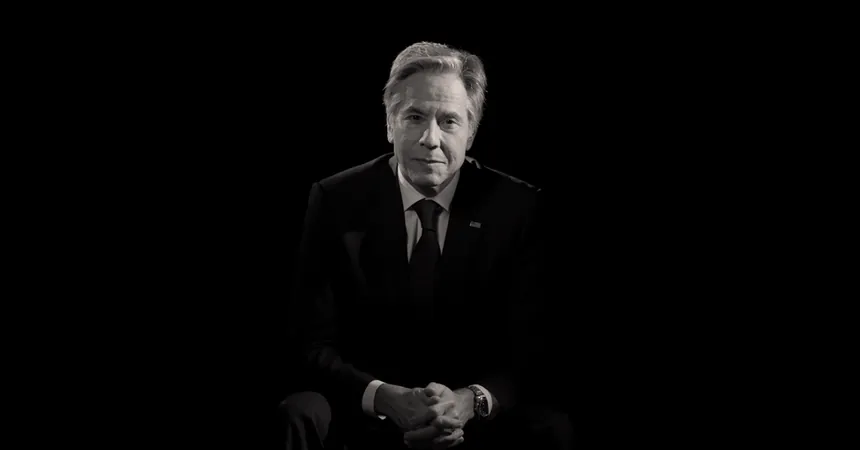
Reflections on U.S. Foreign Policy: Antony Blinken Defends Biden Administration's Choices
2025-01-04
Author: Jia
U.S. Foreign Policy Legacy
In a candid discussion, Antony Blinken, the U.S. Secretary of State, recently elaborated on the Biden administration's foreign policy legacy, specifically contrasting it with the preceding Trump era. Four years ago, the administration inherited significant challenges, including the worst economic crisis since the Great Depression and a public health emergency. As they prepare to leave office, Blinken insists that the country is in a much stronger position, citing improved international relations and alliances.
Global Engagement and Skepticism
Blinken emphasized the importance of global engagement, arguing that most Americans support a proactive foreign policy. However, he acknowledged the skepticism some voters express toward international involvement—stemming from the desire to avoid conflict after two decades of military entanglements in Iraq and Afghanistan. He reiterated that the Biden administration is committed to ensuring the U.S. does not return to prolonged conflicts abroad.
Withdrawal from Afghanistan
Reflecting on the chaotic withdrawal from Afghanistan, which tarnished the administration's foreign policy reputation, Blinken stood firm in his belief that ending the longest war in U.S. history was a significant achievement. He expressed no regrets about the exit but affirmed the lessons learned from the operation, which are being applied to other ongoing crises globally.
Support for Ukraine
The discussion also highlighted the pressing issue of Ukraine, where Blinken revealed the administration's strategies for supporting Ukraine without direct conflict with Russia. He recalled the tense moments leading up to Russia's invasion in 2022, emphasizing the importance of preparation and strategic weapon shipments to bolster Ukraine's defenses.
Challenges in Gaza
Yet, the ongoing situation in Gaza poses one of the most significant challenges for the Biden administration. Blinken reflected on the initial hopes for a normalization agreement between Saudi Arabia and Israel that were shattered following the Oct. 7 Hamas attack. The resulting humanitarian crisis has brought criticism towards both Israel and the U.S. regarding their military strategies and humanitarian responses.
U.S. Support for Israel and Humanitarian Aid
Despite the U.N. figures reporting thousands of Palestinian casualties and widespread destruction, Blinken maintains that the U.S. support for Israel's right to defense is critical, particularly amid threats from groups like Hamas and Iran. He acknowledged the complexity of ensuring humanitarian aid reaches those in need while advocating for Israel's security.
Future of U.S. Foreign Policy
The future of U.S. foreign policy under a potential Trump administration remains uncertain, especially regarding ongoing global issues. Blinken urged the necessity of American engagement, arguing that without it, diplomatic vacuums could allow other powers to shape the international landscape in ways counter to U.S. interests.
Conclusion
Overall, as the Biden administration looks to hand over its foreign policy strategies to its successor, Blinken emphasizes a foundation built on diplomatic relations and crisis management, underscoring that the fight against autocracy and the promotion of democracy remain at the core of U.S. international relations. Whether this legacy will take root under new leadership is yet to be seen, but what is clear is that navigating these tumultuous waters will require resilience and strategic engagement in the years to come.




 Brasil (PT)
Brasil (PT)
 Canada (EN)
Canada (EN)
 Chile (ES)
Chile (ES)
 Česko (CS)
Česko (CS)
 대한민국 (KO)
대한민국 (KO)
 España (ES)
España (ES)
 France (FR)
France (FR)
 Hong Kong (EN)
Hong Kong (EN)
 Italia (IT)
Italia (IT)
 日本 (JA)
日本 (JA)
 Magyarország (HU)
Magyarország (HU)
 Norge (NO)
Norge (NO)
 Polska (PL)
Polska (PL)
 Schweiz (DE)
Schweiz (DE)
 Singapore (EN)
Singapore (EN)
 Sverige (SV)
Sverige (SV)
 Suomi (FI)
Suomi (FI)
 Türkiye (TR)
Türkiye (TR)
 الإمارات العربية المتحدة (AR)
الإمارات العربية المتحدة (AR)